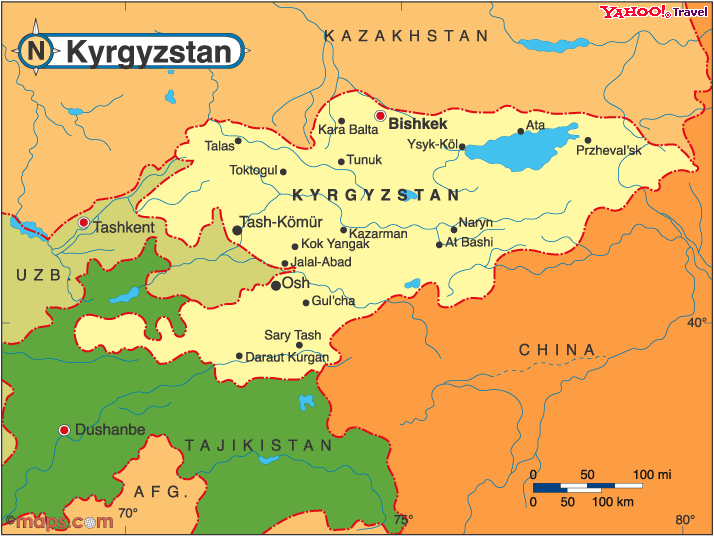I met with the director of CBT and will be staying in the Naryn region from Monday the 22nd of September until the 31st of October. I will have a short time back in Bishkek from the 4th until the 6th so that I can vote and meet a volunteer for the Alpine Fund at the Airport. Here is the bazaaristan post. With luck, I'll get a few more up in the next couple days. Pictures too, must have pictures.
There is a meat and cheese bazaar near my residence in Bishkek. It’s tough to know what specialization a bazaar has until I have been informed. Standard stalls which sell everyday foodstuffs, drinks and occasionally cell phone minutes as well as kiosks which sell papers, pens, and other everyday generally disposal items are the irreducible constituents prerequisite for any neighborhood bazaar. Mister Uzgunbek, the patriarch at home and Professor of Environmental Engineering, claims that this will all be gone – overrun by supermarkets. When I ask, why he explains simply, “Because that’s capitalism.”
He has a point. Though the pressure has often come from the state, not from sudden submersion in capitalism. Modern state leaders from Ata-Turk to the late Shah of Iran to contemporaries in
In actuality, one would be hard pressed to find a more robust example of capitalism in action anywhere in the world. Bazaar offer conditions of near perfect competition. Sellers of the same products are situated directly beside one another. The buyer and seller can come to a price which is suitable considering the quantity and regularity of purchase. It is, however, difficult to levy taxes reliably on goods which change in value with each transaction.
Business at the meat and cheese bazaar has apparently slowed over the years. On this Saturday about 2/5 of the stalls stood vacant. Still, every neighborhood hosts a mini-bazaar of some kind in Bishkek. And the overall activity does not seem diminished.
We shopped for a while. It always seems to take longer than necessary. This is due largely to the haggling posture taken up by Mister Ozgonbek’s wife, Anara. The family with whom I live is middle class in a land of rich and poor. They own a car, but it’s a Soviet Lada. They seem to have everything that they need but everything in the house serves a purpose. As I said, the father is a professor; the daughters work in tourism. Service jobs in a material economy.
Anara scrutinizes every stall and each potential purchase with an intense interest muffled with a well rehearsed air of total ambivalence. There is a great deal of looking at each item, picking it up, prodding it and then, scowling delicately while asking questions she already knows the answer to: “Is this any good? Is it fresh? It supposed to have this inconsequential potential defect?” Then she attempts to arrive at a price. Sometimes the posturing goes beyond where I comprehend the search for some leverage over the price. After purchasing a large quantity of bottled water, but before I had carried the bottles away, she noticed some small bubbles in most of the bottles. In a slightly accusatory tone she told the shopkeeper that she wanted NO gas. Surprised by the problem, the shopkeeper assured her with audible exasperation that despite the appearance of bubbles, there was no gas (“Look, when you squeeze it, it’s soft. No gas.”) Anara was unconvinced but was willing to risk it if there could be a slight price reduction. No dice. “Look, they are non-gas, if you don’t want them, leave them here and take you’re money.” So we did.
We bought the same number of bottles at a comparable price not long thereafter. And as we walked back to the car Anara said in order to explain, “We need the ones without gas.” The first batch were clearly gasless in my opinion but the haggling at the bazaar is about more than empty posturing. The only explanation for Anara’s cold feet is that she plays her hand close to her chest. None of the other interactions/transactions at the bazaar carried the odd incredulity of this example. Still, the air of skepticism and disinterest was heavy from the start of each approach.
That seems a long way to go for a seemingly pointless story, but it struck me for some reason that I have not put my finger on. I certainly do not see that kind of practiced posturing in a supermarket. What really grabbed my attention was Anara’s steadfast belief in her position in each case. I believe that if I asked her hours later why she did not just save time and buy the first batch of bottles, she would have replied that, as she already said, it was because the bottles had gas.
This reminds me of observing a politician at work. Each stance and word is calibrated by a keen sense of advantage. The entire argument expounded is too broadly sympathetic, too utilitarian to be honest. But the conviction with which the message is delivered remains remarkable. And, when they do their job well, it seems that they believe their own constructions are inherent and true. They articulate the truth. They would never dare to create it.


No comments:
Post a Comment